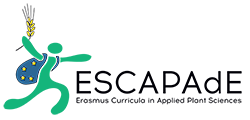English title:
Horticultural products as a source of functional food: physiological and nutritional aspects
Course ID:
952337
ECTS credits:
3,0
Title in native language:
Horticultural products as a source of functional food: physiological and nutritional aspects (in Eng.)
Horticultural products as a source of functional food: physiological and nutritional aspects (in Eng.)
Term Semester:
Autumn/Winter
Instruction language(s):
English
Course content:
Functional food, definition, classes and its rule in human nutrition. Classification of phytochemicals. Occurrence and characteristic of main bioactive compounds of horticultural products: polyphenolics, terpenes, ascorbic acid, glucosinolates, glycoalkaloids, antinutritive compounds. Factors influencing content of phytochemicals in horticultural products – in vitro technics, use of elicitors, etc. Chosen applications of horticultural products for the functional food – seminar work of students.
Expected previous knowledge:
Knowledge of basic rules and theories of chemically, biochemically and physically processes
Learning outcomes:
The students learn about the potential that is represented by the diversity of horticultural produces to be used for the production of functional food. The mediated know-how comprises the physiological and nutritional specifications of horticultural products, the specific suitability of species and cultivars, the factors that are responsible for quality formation and maintenance, especially with respect to human nutrition. The students are able to distinguish the various groups of functional food (e.g. convenience, organic, ethnic, minimally processed) and to characterize them, to designate examples and explain their significance in human nutrition. They know about the possibilities and limitations to regulate the contents of health-relevant compounds present in horticultural products, based on plant physiological and nutritional aspects (appropriate genetic potential, targeted cultivation and postharvest treatments). They know the advantages and disadvantages of the main groups of functional food of plant origin, the requirements with respect to their quality and durability during shelf-life, are familiar with spoilage processes and possibilities of their minimization.
Teaching and learning methods:
Media supported lectures, discussion, demonstrations and films;
30 h of presence time in the lectures, 60 h of preparation and follow-up activities incl. literature research and preparation for examination
30 h of presence time in the lectures, 60 h of preparation and follow-up activities incl. literature research and preparation for examination
Exam method:
active participation - 10%
written evaluation (extended report) - 40%
oral presentation - 40%
handout - 40%
Grading key generally
1 (very good) 100–90%
2 (good) 89–80%
3 (satysfying) 79–64%
4 (sufficient) 63–51%
5 (not sufficient) 50–0%
written evaluation (extended report) - 40%
oral presentation - 40%
handout - 40%
Grading key generally
1 (very good) 100–90%
2 (good) 89–80%
3 (satysfying) 79–64%
4 (sufficient) 63–51%
5 (not sufficient) 50–0%
Organisation: University of Natural Resources and Life Sciences Vienna
Country:
Austria
Acronym:
BOKU
ERASMUS+ code:
A WIEN03
Teaching period summer semester:
22. Feb 2021 - 30. Sep 2021
Teaching period winter semester:
13. Oct 2020 - 21. Feb 2021
University website:
